Potential Surge Of US LNG Exports From Shale Natural Gas Boom Splits Corporate America; One Side Gets Allied With Environmentalists
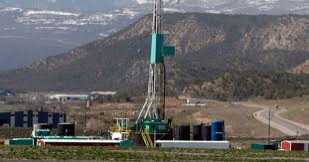
On a humid Thursday last April, hundreds of residents of Lake Jackson, a small town on the outskirts of Houston, jostled a college auditorium stage to catch a glimpse of Texas’ rip-roaring governor, Rick Perry. The governor was there to join Dow Chemical Co. (NYSE:DOW) Chairman and CEO Andrew N. Liveris in announcing the chemical giant’s plans for a $4 billion expansion of its operations in southeastern Texas, creating almost 5,000 jobs.
The mood was celebratory. "If you had told me 10 years ago I'd be standing up on this podium making this announcement, I would not have believed you,” said Liveris, citing the “miracle” of the shale boom. "Even though Texas had its great mechanisms to attract business, the cost of energy, the cost of feedstocks, which would have been the price of oil and the price of gas, was pricing the United States out of the market." He was referring to the recent revolution in the ability to extract natural gas from the country’s vast shale formations using hydraulic fracturing, aka fracking, which has led to a bounty of cheap natural gas, one of Dow’s key raw materials.
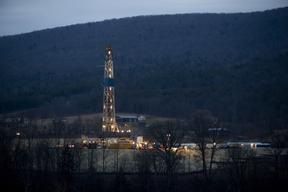
As production has surged -- to about 25 billion cubic feet in 2012 from 17.28 billion cubic feet in 1985 (based on monthly reports of the U.S. Energy Information Administration, or EIA) -- the commodity’s price has plummeted: In one case, it went from more than $13 per million British thermal unit in the summer of 2008 to $3.18 per MMBtu a year later. Since then, its price has ranged from a monthly low of $2.98 to a high of around $4, a real bargain by any measure. That’s as good for manufacturers as it is bad for natural-gas producers and drilling companies, since low prices mean reduced exploration and production.
As a result, the boom in production has created a rare fissure that runs through the heart of corporate America, pitting manufacturers such as Dow Chemical against energy giants such as the Exxon Mobil Corp. (NYSE:XOM), which have been seeking to raise the price of natural gas by pushing the government to allow them to export to more countries. That concerns manufacturers, which warn that such an export-heavy policy will result in higher energy prices in the U.S. and hurt manufacturing. The policy proposal has also spawned a rare alliance between manufacturers and environmentalists, who have long argued that fracking diverts water from agricultural uses and pollutes the water supply.
Energy companies have been urging the U.S. Energy Department to let them export their gas to nations with which the U.S. does not have a free trade agreement, or FTA, something only the Energy Department can permit, provided it determines that such ventures are consistent with the “public interest,” as required by the Natural Gas Act. As of this date, 17 applications for multibillion-dollar facilities to turn the commodity into liquefied natural gas, or LNG, for export are under review by the Energy Department.
'Shale Gale' Through 2040
The so-called "shale gale" is not about to blow over. On Thursday, the Bureau of Economic Geology at the University of Texas at Austin released what it called the most comprehensive study to date on shale gas in one part of Texas. Combined with similar studies, it indicates that the nation’s reserves of shale gas are abundant enough to provide gas at or near its current price through 2040.
In other words, the U.S. is in for nearly three more decades of low natural-gas prices, which concerns drilling contractors such as the Parker Drilling Co. (NYSE:PKD) and well-service firms such as Schlumberger Ltd. (NYSE:SLB). Low prices mean reduced exploration and production, something Wall Street is well aware of.
“For U.S. natural gas, we look for low prices to depress U.S. gas drilling activity. According to the EIA, after growing 8 percent and 4 percent in 2011 and 2012, respectively, natural gas production is expected to rise 1 percent in 2013, before a modest decline in 2014,” Standard & Poor's Capital IQ said.
The energy business has only two options, tighter supply or higher demand, such as comes from Asia’s growing economies. The former is a virtual impossibility; the latter is -- potentially -- two to three years away, assuming the Energy Department takes a generally positive stance on the LNG applications.
Dow’s profits document the bargains engendered by the shale gas boom -- sometimes called the “shale gale” -- and the resulting cheap natural gas. The company reported net income from continuing operations of $2.32 billion in 2010, compared with $566 million in 2009. Earnings were up in 2011, too, although not as dramatically. Last year’s earnings, on an adjusted basis, slipped to $2.25 billion from $3 billion, but the company said its “purchased feedstock and energy costs” fell during the year by a whopping $2.5 billion.
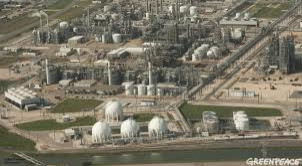
There’s more of the same ahead for Dow and its peers, according to S&P.
“The decline in the U.S. natural gas prices relative to global crude oil prices has improved the feedstock cost competitiveness of the U.S. petrochemical industry versus other global regions, such as Europe, thereby helping boost U.S. industry exports,” S&P said. “Thus, we look for higher industry sales and profits in 2013.”
Will Increased Exports Hurt Manufacturers?
As the Energy Department considers the LNG applications, it commissioned NERA Economic Consulting to prepare a study of the consequences of more LNG exports to help guide its determination of what is in the public interest. The consulting group completed its study in December, and the results stung manufacturers.
“Across all these scenarios, the U.S. was projected to gain net economic benefits from allowing LNG exports,” the NERA report said. “Moreover, for every one of the market scenarios examined, net economic benefits increased as the level of LNG exports increased. In particular, scenarios with unlimited exports always had higher net economic benefits than corresponding cases with limited exports. In all of these cases, benefits that come from export expansion more than outweigh the losses from reduced capital and wage income to U.S. consumers, and hence LNG exports have net economic benefits in spite of higher domestic natural gas prices.”
Beginning this month, the Energy Department will start a case-by-case evaluation of the applications. Prospects of such permits being issued, especially if many are approved, are raising hackles in manufacturing-company boardrooms across the nation.
Some manufacturers are worried enough that the department will open the proverbial floodgates to LNG exports that they are willing to break long-standing industry ties. A few weeks ago, Dow rocked the American industrial establishment by dropping its membership in the 117-year-old National Association of Manufacturers (NAM), the largest manufacturing association in the U.S. with more than 12,000 member companies.
“In late January, with no discussion or notification, NAM adopted a new position on this issue which placed the interest of oil and gas producers above the interests of its manufacturer members,” Dow said.
The following month, Dow CEO Liveris warned a U.S. Senate committee that unrestricted LNG exports could kill the “renaissance” in America’s manufacturing sector.
“If we shipped half or more of [natural-gas production] overseas today as some propose, it will have severe unintended consequences,” Liveris said at a Feb. 14 hearing. “It would actually mean higher gas and electricity prices. It will actually mean higher transportation and utility costs for consumers as well as industry. These higher and more volatile energy prices will also cause domestic manufacturers to once again ship operations and ship jobs, to ship factories overseas to countries where natural gas is cheaper. And there are countries where natural gas is cheaper. America would sacrifice this once-in-a-generation competitive advantage.”
Dan DiMicco, executive chairman of the Nucor Corp. (NYSE:NUE), also stresses a both-and approach.
“We need to be smart about how we use our natural gas resources in order to maximize the economic benefit for our country,” DiMicco said. “Using natural gas to grow our manufacturing sector will create far more jobs and value for our economy than exporting LNG alone. A policy of unlimited LNG exports would be a mistake. We need a balanced approach that benefits natural gas producers, manufacturers, and American workers.”
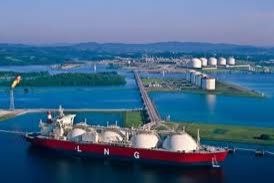
These views aren’t just voiced in the C-suites of manufacturing plants -- they can also be heard in factory break rooms.
Lynne Hancock, a representative of the United Steelworkers, which represents chemical-plant workers, said the USW does not currently have a position on increases in LNG exports. But she said her husband works at the BASF plant in McIntosh, Ala., a facility built in the early 1950s that depends on natural gas.
“A chemical worker would probably say, ‘We need to keep natural gas cheap,’” Hancock said, adding that BASF plant jobs are among the few good-paying positions in Washington County, “which is very poor.”
Dow, which spent $45 million on lobbyists over the last six years, isn’t alone. It’s been joined by big manufacturers such as Alcoa Inc. (NYSE:AA), the Celanese Corp. (NYSE:CE), the Eastman Chemical Co. (NYSE:EMN), and the Huntsman Corp. (NYSE:HUN), as well as Nucor. They have organized an interest group named America’s Energy Advantage that is urging the Energy Department to be cautious about how many LNG export applications it approves.
The unlikely ally of these industrial behemoths is a wide array of environmental groups that oppose increased LNG exports because they believe it would spur more fracking.
On Feb. 12, a coalition of 40 groups and individuals issued a statement calling on U.S. President Barack Obama to “take a ‘time out’ in the headlong run to export more than 40 percent of America’s natural gas for use by other nations.” The statement, published in the New York Times, was signed by actors Debra Winger and Mark Ruffalo, the Sierra Club, and “Gasland” director Josh Fox.
“Exporting Liquefied Natural Gas (LNG) to overseas markets will mean more drilling and fracking on US land, which are dirty and dangerous practices,” the statement said. “Exports will allow the gas industry to make billions of dollars at the expense of our communities and public health. Gas exports will mean higher energy costs for consumers and American industries. Jobs could end up being shipped overseas. The extraction and transport of natural gas release huge amounts of greenhouse gases into the atmosphere, adding to climate change and continuing our reliance on dirty fossil fuels instead of clean energy solutions.”
In addition, the Sierra Club is warning that more LNG exports will increase air pollution, public health risks associated with elevated levels of benzene and methane, and the use of coal-fired electricity. Last fall, it issued a report to that effect, which it described as “a red flag to the DOE that rubber-stamping approval of proposed LNG export facilities would be a serious mistake,” a reference to the Energy Department’s case-by-case review of LNG export facility applications.
The Other Side
Lined up against big manufacturers such as Alcoa, Dow, and Nucor are big energy companies such as Exxon Mobil, one of America’s largest natural-gas producers, and major industry groups such as NAM, the American Petroleum Institute and the Independent Petroleum Association of America, or IPAA, which represents 85 percent of U.S. natural-gas producers.
In a statement posted on its site, NAM declared: “Proposals that seek to limit LNG or coal or any other product would have far-reaching negative effects on the United States and should be rejected. Such restrictions limit economic opportunities and stifle job growth rather than provide a source of increased economic growth.”
The nation’s main association of natural-gas producers also argues that increased LNG exports support the broader economy.
“Any artificial limit of natural gas export will not be a favor to the American people and because we represent natural gas producers we have concerns it will discourage natural gas exploration projects, limit production and end up costing good jobs and economic growth in the process,” said Julia Bell, an IPAA representative.
These companies have been joined by a number of economists and Wall Street analysts who see a big jump in LNG exports as a win-win for the nation’s economy.
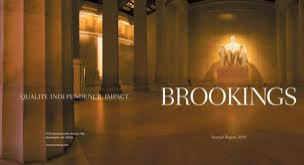
Exxon Mobil recently noted that the NERA study found that the economic benefits to the country from LNG exports are “significant and clearly outweigh any potential increases in domestic natural gas prices. The study’s findings are also consistent with other independent studies such as the Brookings Institution that project positive net economic effects from LNG exports.”
Exxon Mobil also cited the EIA in saying that the most pro-free trade option would likely yield an additional 2 trillion cubic feet of U.S. natural-gas production. “That translates to more supply -- and with it, more jobs, government revenues and economic expansion,” the company said.
NAM has also made much of the NERA study. “Proposals that seek to limit LNG or coal or any other product would have far-reaching negative effects on the United States and should be rejected,” NAM said. “Ninety-five percent of the world’s consumers are outside the United States, and exporting has been a vital part of America’s heritage and must be a cornerstone of its future. To reach the goal of doubling exports by 2014, the United States must not restrict any company’s ability to expand its market for any commodity.”
The American Chemistry Council (ACC), which has about 160 members -- including Dow -- issued a statement Feb. 6 supporting LNG exports.
“The Executive Committee unanimously expressed its opposition to any new export bans or restrictions on liquefied natural gas such as a moratorium on export terminals or the prohibition on the export of natural gas produced on public lands,” the ACC said. "The Executive Committee also reaffirmed its support for free-market policies that promote the export of American-made goods, including the export of liquefied natural gas."
However, in the same statement the ACC signaled that its position on the issue may be developing.
"Where there is not a clear consensus among the membership on the question of whether the Natural Gas Act’s 'public interest' requirement should be further defined in export-permitting to non-FTA countries. The Executive Committee agreed to establish a senior level committee to further discuss this issue and determine if a consensus can be reached. This committee is also chartered with monitoring and discussing energy-related issues that could affect the competitive position ofour industry in the future, such as infrastructure development and access to energy resources."
© Copyright IBTimes 2024. All rights reserved.





















